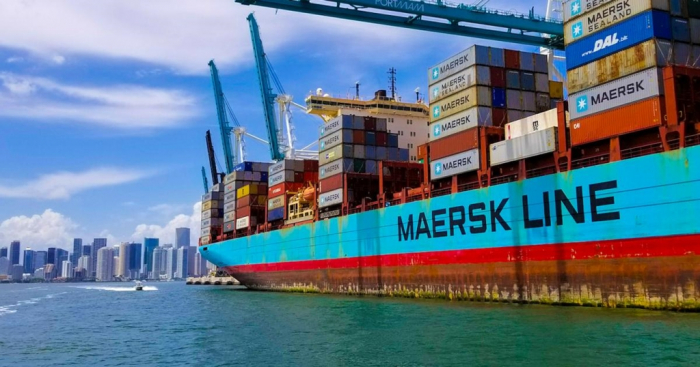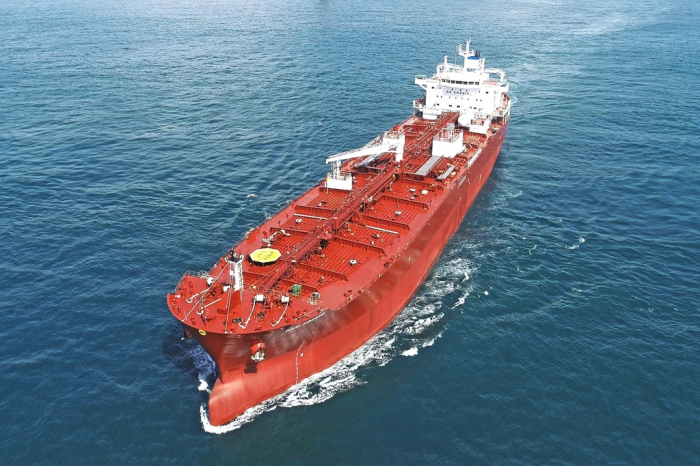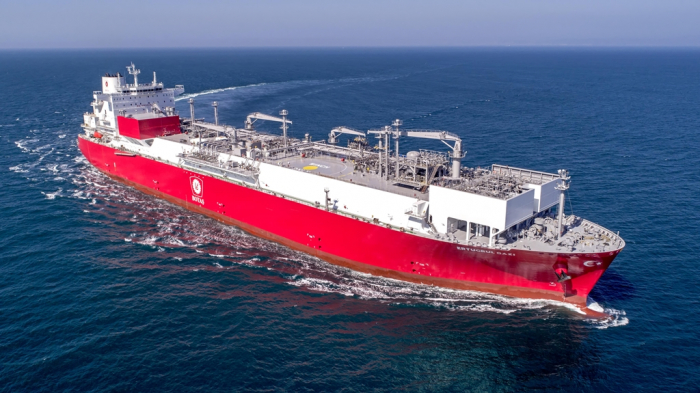Shipping & Shipbuilding
KSOE in $1.5 billion shipbuilding deals with Maersk, Excelerate Energy
With the contracts for methanol-powered ships and an LNG-FSRU vessel, KSOE has already exceeded its 2022 target of $17.44 billion
By Oct 05, 2022 (Gmt+09:00)
2
Min read
Most Read
LG Chem to sell water filter business to Glenwood PE for $692 million


Kyobo Life poised to buy Japan’s SBI Group-owned savings bank


KT&G eyes overseas M&A after rejecting activist fund's offer


StockX in merger talks with Naver’s online reseller Kream


Mirae Asset to be named Korea Post’s core real estate fund operator



Korea Shipbuilding & Offshore Engineering Co. said on Wednesday it has clinched a 1.62 trillion won ($1.15 billion) order to build six methanol-powered containerships for Denmark’s A.P. Moller-Maersk.
KSOE, the intermediate shipbuilding holding company of the Hyundai Heavy Industries Group, also said it separately secured a 475.7 billion won deal to build a 170,000-cubic-meter liquefied natural gas floating storage and regasification unit (LNG-FSRU) for US-based Excelerate Energy Inc.
With the combined 2.1 trillion won, or $1.5 billion, deals, KSOE has so far won orders for 183 ships worth $21.82 billion, exceeding its full-year target of $17.44 billion.
The company said it will build six 17,000 twenty-foot equivalent unit (TEU) ships at its shipyard in Ulsan and deliver them to Maersk, the world’s top shipping company, by 2025.
The LNG-FSRU vessel will be built at the same shipyard and delivered to Excelerate Energy by 2026.
KSOE has three shipbuilders under its wing – Hyundai Heavy Industries Co., Hyundai Samho Heavy Industries Co. and Hyundai Mipo Dockyard Co.

ECO-FRIENDLY SHIPS
The deal with Maersk comes as global shipbuilders and shipping firms are required to comply with tighter carbon emission rules.
Equipped with dual-fuel engines, the methanol-powered containerships will help Maersk reduce its carbon dioxide emissions.
In August of last year, Maersk placed a shipbuilding order with KSOE for eight 16,000 TEU methanol-powered containerships.
With the latest deal for six ships, KSOE has won a total of 19 methanol-powered containerships from Maersk.
When all 19 ships are up and running, Maersk will be cutting carbon dioxide emissions by 2.3 million tons, according to KSOE.

TIGHTER EMISSION RULES
“By winning a series of orders for methanol-powered ships from Maersk, we have proven our technological prowess,” said a KSOE official.
The Korean shipbuilding group entered the methanol-fueled vessel construction business in 2016 when Hyundai Mipo built two such vessels for the first time in the industry.
With major economies around the world attempting to cut emissions in order to meet net-zero targets, the shipping sector has been looking for ways to cut the environmental footprint of its operations.
Methanol has been a less-favored fuel for ships because of higher production costs. With increased natural gas production globally, however, demand for methanol-powered ships is increasing in line with tighter environmental regulations by the International Maritime Organization (IMO).
Methanol is also easier to store, transport and handle compared to other emission-free fuels such as LNG.
The IMO requires its member states to cut carbon emissions from ships by 30% of their 2008 levels by 2025 and raise the target to 70% by 2050.
Write to Ik-Hwan Kim at lovepen@hankyung.com
In-Soo Nam edited this article.
More to Read
-
 Shipping & ShipbuildingHyundai Heavy's KSOE expected to turn to black in Q3
Shipping & ShipbuildingHyundai Heavy's KSOE expected to turn to black in Q3Oct 03, 2022 (Gmt+09:00)
2 Min read -
 Shipping & ShipbuildingHyundai Heavy’s KSOE wins $2.2 billion order for 10 LNG carriers
Shipping & ShipbuildingHyundai Heavy’s KSOE wins $2.2 billion order for 10 LNG carriersJul 07, 2022 (Gmt+09:00)
1 Min read -
 Leadership & ManagementChung Ki-sun joins KSOE boardroom, to take helm at Hyundai Heavy
Leadership & ManagementChung Ki-sun joins KSOE boardroom, to take helm at Hyundai HeavyMar 23, 2022 (Gmt+09:00)
2 Min read -
 Shipping & ShipbuildingKSOE in $1.4 billion deal to build 8 methanol-powered ships for Maersk
Shipping & ShipbuildingKSOE in $1.4 billion deal to build 8 methanol-powered ships for MaerskAug 24, 2021 (Gmt+09:00)
2 Min read
Comment 0
LOG IN


